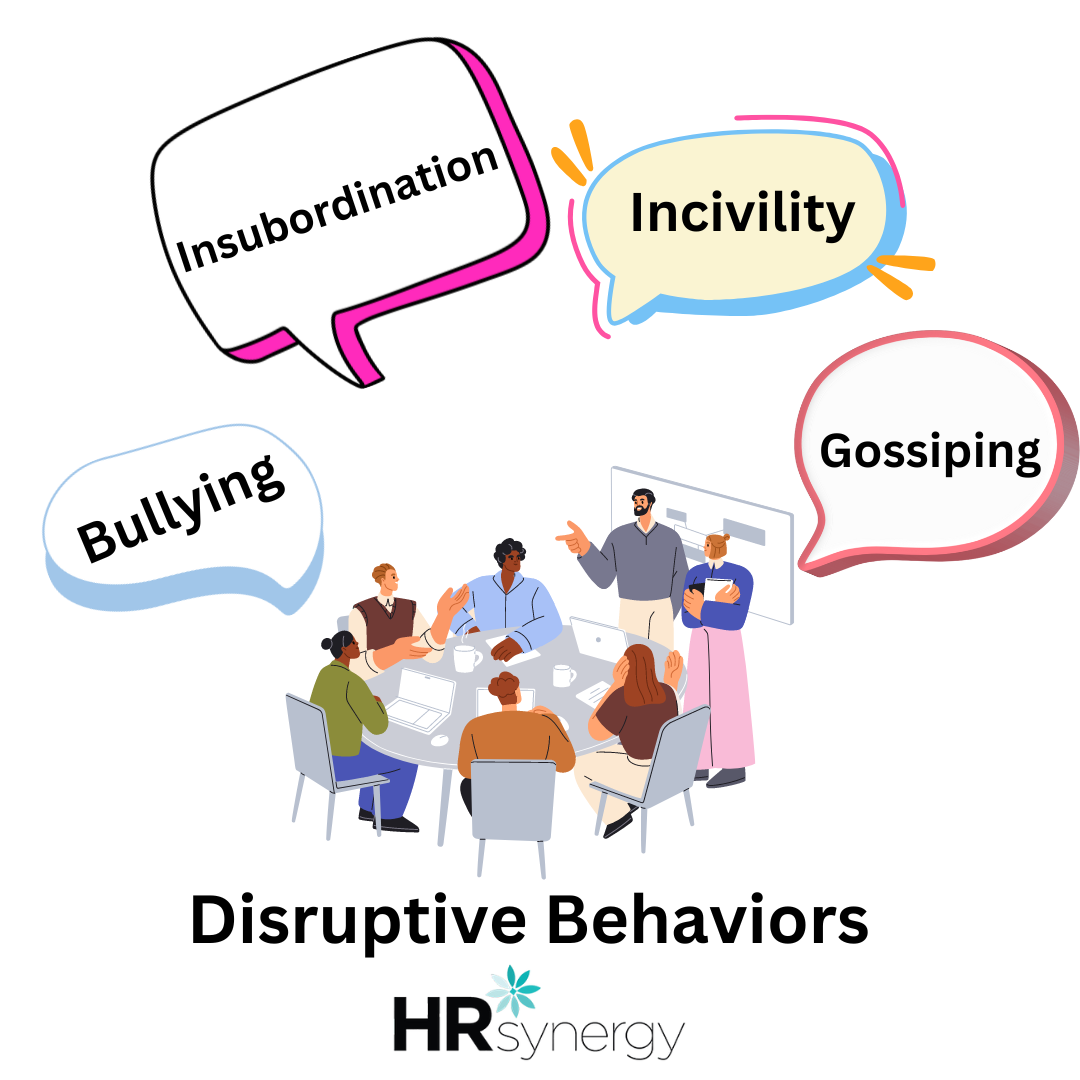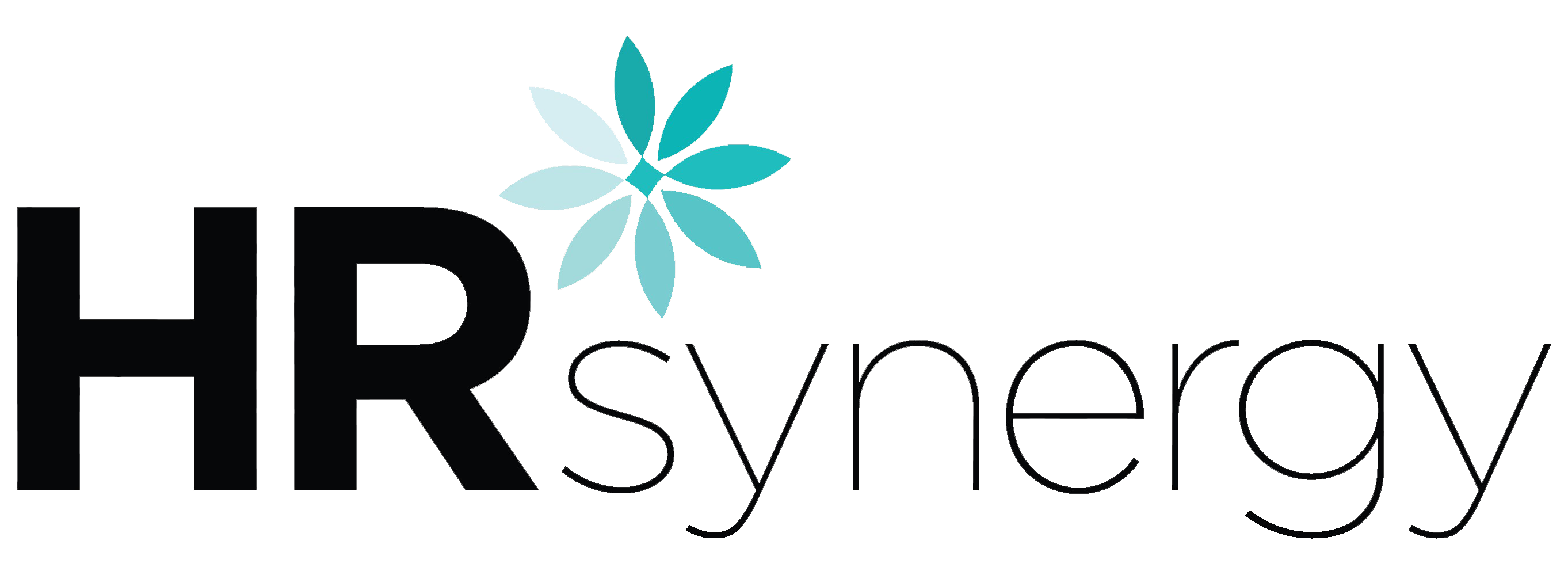Sign up for our MIDDLE MANAGERS TRAINING! Next training is May 23 3-4pm.
Employee morale, productivity, and customer service thrive in environments where teamwork and mutual respect are practiced. However, disruptive behaviors among employees can undermine these factors, leading to negative consequences for your organization and potential legal liabilities. While employers must respect employees’ rights to concerted activity under the National Labor Relations Act (NLRA), they must address behaviors that undermine collegiality and professionalism. Together, let’s address common difficult and disruptive behaviors, highlight risk to your organization if left unaddressed, and provide suggestions for managing the performance of individuals exhibiting these behaviors constructively.
Common disruptive behaviors include gossiping, incivility, bullying, and insubordination. These behaviors can lead to decreased productivity, increased turnover, and legal expenses. HR Synergy professionals can play a vital role in training you how to address these behaviors by providing guidance, training, and conflict resolution assistance to managers.

Disruptive behaviors in the workplace have wide-ranging impacts, including decreased productivity, performance, and employee commitment, as well as damage to company reputation. These behaviors can lead to increased turnover costs, sick leave usage, disability claims, and legal expenses. Toxic behaviors can spread, affecting your entire organization’s culture and morale. A 2017 survey by the Workplace Bullying Institute revealed alarming statistics, including high rates of bullying and awareness of abusive conduct in the workplace. Many bullies are in positions of authority, and targets often suffer adverse health effects, leading to a significant percentage leaving their jobs. Addressing workplace bullying requires a top-down approach, as offenders often hold higher job statuses than targets. Additionally, employers must be vigilant about employee use of social media, as it can perpetuate bullying and damage the company’s reputation if negative postings go viral. Swift action is necessary when such incidents come to light.
HR Synergy professionals are vital in training managers how to deal with difficult employees. We can act as business partners, offering guidance and training. HR Synergy’s trainings help managers recognize and address issues, especially interpersonal ones that they may avoid. By identifying problems and strategizing solutions, HR Synergy’s trainings aid in conflict resolution early on, contributing to a broader organizational strategy aimed at preventing workplace violence.
Managers and colleagues often hesitate to address disruptive behaviors out of fear of retribution or because they feel unprepared for difficult conversations. Some managers may avoid taking action due to concerns about losing a valuable staff member or because they rationalize their inaction with various excuses. However, ignoring the problem only allows it to worsen, as the disruptive individual may perceive tolerance as acceptance. Managers may inadvertently enable problem behavior by working around the issue or playing favorites. Addressing disruptive behaviors early is essential to preventing escalation and maintaining a positive workplace culture. It’s crucial for managers to investigate complaints and take prompt, appropriate action to prevent further recurrence. Failure to address disruptive behavior not only condones unprofessional conduct but also exposes your organization to potential legal liabilities.
Dealing with difficult employees and disruptive behaviors requires proactive strategies. Strategies for managing difficult employees include training, providing honest feedback, documenting behaviors, and following disciplinary policies. Providing training in people management and conflict resolution equips managers to address issues effectively. Facilitating teamwork activities and civility training can promote a respectful workplace culture. Listening to employees’ concerns and providing honest feedback are essential for addressing disruptive behaviors. Managers should document incidents and follow disciplinary policies consistently. Clear communication of expectations and consequences ensures accountability. Ultimately, employees are responsible for adjusting their behavior to align with organizational expectations.
Clear communication of expectations and regular follow-up are crucial for sustaining behavioral improvements. Corporate codes of conduct and labor agreements typically mandate treating each other with dignity and professionalism while prohibiting harassment and discrimination. However, it’s crucial to ensure these policies don’t infringe on employees’ Section 7 rights under the National Labor Relations Act, which protect their ability to engage in concerted activity regarding employment terms and conditions. Legal review of conduct policies is advisable due to evolving interpretations. Clear communication of expectations helps employees distinguish between acceptable and unacceptable behavior, fostering a respectful work environment.
The cost of workplace bullying and disruptive behaviors can be assessed through various metrics including turnover rates, employee engagement levels, commitment to the organization, job satisfaction, productivity levels, work quality, and estimated lost work hours. These indicators provide insights into the financial and cultural impact of such behaviors on the organization.
While workplace bullying is unacceptable, federal law does not explicitly prohibit it unless it is tied to discrimination. Some states have introduced anti-bullying legislation to address this issue. Overall, creating a respectful workplace culture requires proactive management and adherence to legal standards.
Effectively managing difficult employees and disruptive behaviors is essential for maintaining a positive and productive workplace environment. By identifying problem behaviors early, fostering a culture of respect, providing training and support to managers, and following proactive communication and disciplinary procedures, HR Synergy professionals can help you mitigate the impact of disruptive behaviors and promote a healthy work environment for all employees.
Contact us for more information about MANAGER TRAININGS WE OFFER.
Sign up for our MIDDLE MANAGERS TRAINING! Next training is May 23 3-4pm.
Read more from our MIDDLE MANAGERS SERIES:
The challenges faced by middle managers
Some key managers’ desires and potential solutions
1st-time managers often are ill-prepared for their new role
Caring for Caregivers: A Manager’s Guide to Supporting Employees in Their Caregiving Roles
Tips for New Managers Who Are Now Supervising Their Former Peers
Managing Difficult Employees and Disruptive Behaviors: A Comprehensive Guide for HR Professionals
